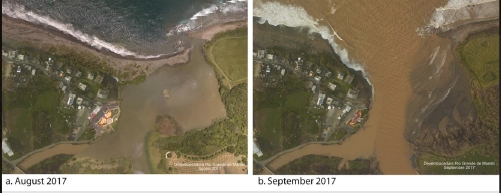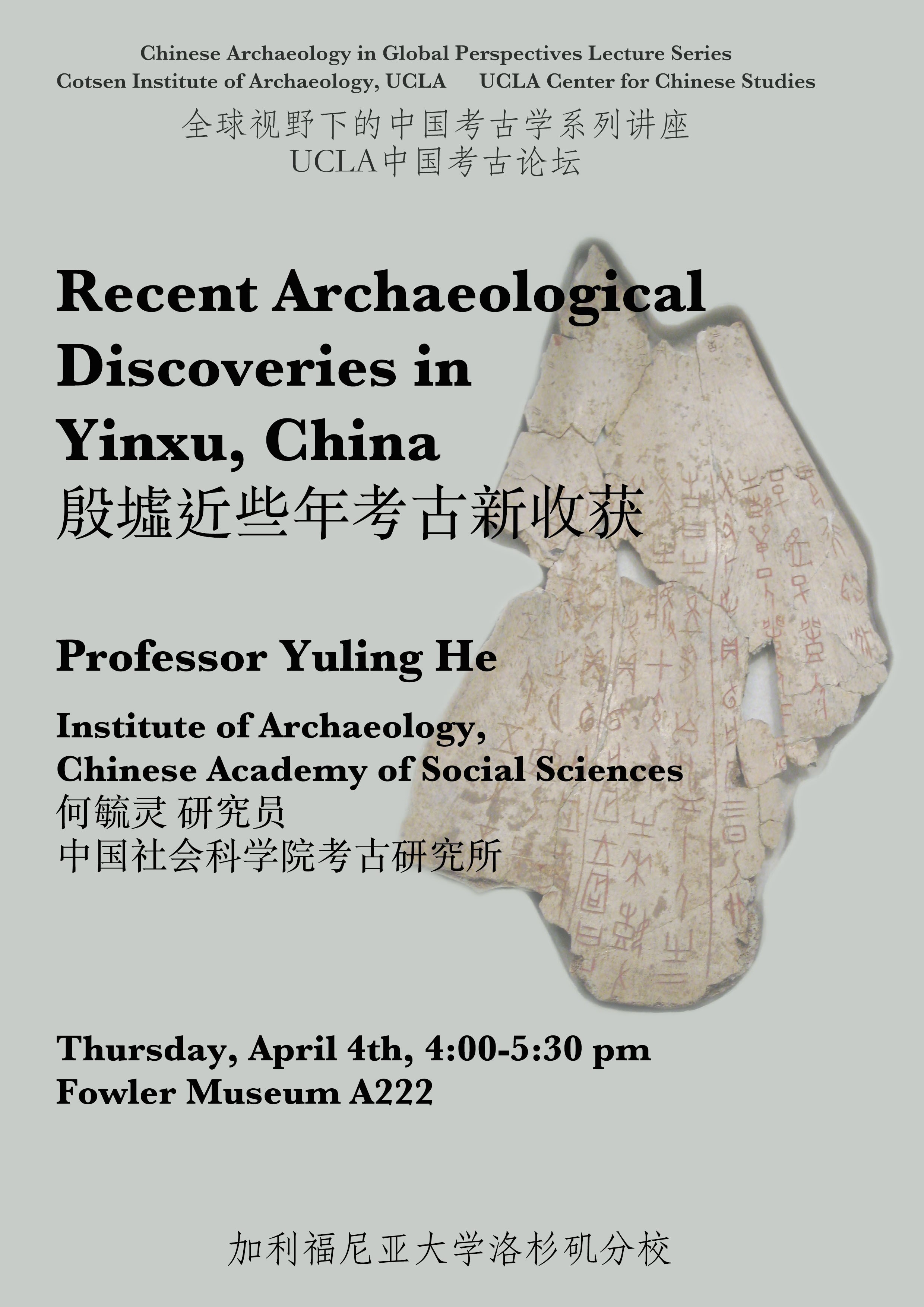Past Events
Interested in Cotsen events? Sign up for our mailing list.Egypt in Africa
Professional presentations by UCLA undergraduate students

Contact Willeke Wendrich
Phone
Please join the Y&S Nazarian Center for Israel Studies in “The Dig,”. This award-winning one-woman play, accompanied by live music written and performed by Yuval Ron, follows an American archeologist's journey to discover the truth about an artifact in Israel that could have transformational implications for Israel, the Middle East and the world.
To RSVP, visit https://www.international.ucla.edu/israel/event/13721.
Contact Sumiji Takahashi
Email sutakahashi@ioa.ucla.edu
Phone 310-825-4169
Ahmanson lecturer, Professor Filomena Limão of the Universidade Nova de Lisboa, will give her talk, “The Late Roman Villa of Santiago da Guarda (Ansião,Portugal): Architecture and Mosaics in a living palimpsest”, Sunday April 28th 2019, at 2PM in the Fowler Museum, Room A222 at UCLA.
Contact
Phone
Dr. Jennie Ebeling
Associate Professor
Department of Archaeology
University of Evansville in Indiana
Abstract:
Bread and other grain-based foods were not only staples in the ancient Israelite diet; they were also staples in the ritual acts that accompanied the worship of several deities in ancient Israel. In addition to the state god YHWH, who required regular offerings of lechem hapanim (“bread of the presence”) in the Tabernacle and the Jerusalem Temple (Exodus 25:30, 39:36, 40:23; Leviticus 24: 5-9; Numbers 4:7; 1 Kings 7:48), the Queen of Heaven (Jeremiah 7:18, 44:17-25) was worshipped by families in Jerusalem and throughout Judah with cakes that were marked with her image. Although the biblical writers did not record the details of these practices, the remains of ritual activity in a variety of Iron Age (ca. 1200-586 BCE) archaeological contexts are strongly associated with areas where bread and other foods were prepared and consumed. In this presentation, I will discuss the evidence for feeding the gods in Israelite houses, the house of YHWH, and other contexts, and suggest that the ritual importance of bread in ancient Israel began with women’s food offerings to household deities.
For more details see: https://www.cjs.ucla.edu/event/feeding-the-gods-in-ancient-israel/
Contact Center for Jewish Studies
Email cjsrsvp@humnet.ucla.edu
Phone (310) 267-5327
Dr. Elizabeth (Lisa) Matisoo-Smith
Professor of Biological Anthropology and Chair
Department of Anatomy, University of Otago
The Powers and Pitfalls of Molecular Archaeology
In 1989 it was announced in Nature that DNA could successfully be extracted from
archaeological bone, and thus was born the field of molecular archaeology. The last
decade has seen the field flourish with the development of Next Generation Sequencing
(NGS) technology. While the results of many molecular studies have contributed
positively to our understanding of prehistory, others have not. It must be recognised that
molecular techniques are just tools, and like all tools, they are only useful if used
properly. What is most important is that the right questions are asked, the appropriate
samples to answer those questions are collected, and the results interpreted in the
context of the current knowledge. This paper discusses the past, present and future of
molecular archaeology, focusing on both the strengths and the weaknesses of the
application of molecular techniques and the interpretation of molecular data with
regards to reconstructing the prehistory of the Pacific.
Contact Sumiji Takahashi
Email sutakahashi@ioa.ucla.edu
Phone 310-825-4169
Contact Sumiji Takahashi
Email sutakahashi@ioa.ucla.edu
Phone 310-825-4169

BIO:
Isabel Rivera-Collazo is Assistant Professor on Biological, Ecological and Human Adaptations to Climate Change at the Department of Anthropology and the Scripps Institution of Oceanography at UC San Diego. Dr. Rivera-Collazo is an environmental archaeologist specializing on geoarchaeology, archaeomalacology, coastal and marine processes, maritime culture and climate change, with regional interests in Puerto Rico, the Caribbean Basin and the Neotropics (Pan Caribbean region); Israel and the eastern Mediterranean. Her research focuses on the effect that human activity has over island ecosystems through time, as well as how have people responded to climatic and environmental change in the past. Dr. Rivera-Collazo’s work focuses on resilience and adaptation, investigating what decisions enhance or reduce adaptive success. Taking an applied approach, Dr. Rivera-Collazo also works with local communities in the quest for understanding the current and expected impacts of climate change, including threats to coastal heritage. Dr. Isabel Rivera-Collazo has a MSc degree on Palaeoecology of Human Societies and a PhD on Environmental Archaeology both from the Institute of Archaeology,University College London. She is also Research Fellow of the Center of Tropical Ecology and Conservation (CATEC) and the Laboratory of Environmental Archaeology at the University of Puerto Rico, Rio Piedras Campus.
ABSTRACT:
A popular proverb in Puerto Rico warns that “it is not the same thing to call the devil than to see him come”. For many years, scientists have been warning about the potential impacts of climate change. In the last five to ten years archaeologists have been linking those impacts to heritage. These past two years, 2017 and 2018, have demonstrated the real-life meaning of changing weather – which eventually will add up to changed climate – and it is not the same to see the devil come. In the context of rapidly changing weather, heritage is a tool for adaptation, for recovery of lost knowledge, and for communication of locally relevant climate science. But at the same time, this reality puts heritage professionals at the front of a social, physical and cultural disaster that is simply overwhelming. This presentation will share the experiences of working with archaeological heritage and climate change research in Puerto Rico before, during and after a record-breaking catastrophic year of hurricanes and winter storms, and will contextualize the work of archaeology in the practicality of equity and justice from within the communities themselves.
Contact Sumiji Takahashi
Email sutakahashi@ioa.ucla.edu
Phone 310-825-4169
“Israel and the Samaria Highlands: A Nomad Settlement Wave or Urban Expansion during the Early Iron Age?”
Dr. Yuval Gadot, Director of the Institute of Archaeology
Tel Aviv University
Tuesday, November 13 at 2 PM
Kaplan (formerly Humanities) A51
Archaeology of Ancient Israel Lecture Series
Co-sponsored by the UCLA NELC Department, Alan D. Leve Center for Jewish Studies, and the Cotsen Institute of Archaeology
The Iron I period witnessed a wave of settlements in the highlands of Israel, mostly in Samaria and to some extent in the Upper Galilee and Judah. This wave is usually associated with the genesis of Ancient Israel and is interpreted in light of the collapse of Canaanite urban centers at the end of the 12th century BCE. This lecture reconsiders the reasons behind this wave of settlement throughout the Samaria Highlands during the Iron I (1200-1000 BCE) in light of new understanding of the social and economic reality on the coastal plain, the Jezreel, Jordan, and Hula Valleys, and the regions surrounding the Samaria Highlands.
Please email Aaron Burke (aaburke@ucla.edu) to RSVP.
Contact Aaron Burke
Email aaburke@ucla.edu
Phone
An Ahmanson lecture, co-sponsored by the Cotsen Institute of Archaeology and in recognition of International Archaeology Day, will be on Saturday, October 20th at 2PM at the Fowler Museum Room A222 at UCLA. David Lee, an independent scholar, will present “Pictures of the Past: Introduction to the Rock Art of Western North America”
Contact
Phone
The Annual AIA Los Angeles County Society Fall Garden Party will be in the amphiteater
at the Fowler Museum on the UCLA campus on Sunday, October 7th from 2-4pm. After
refreshments and conversation we will move into Fowler A222 to hear reports from our two 2018
Field School Scholarship awardees: Alexander Lin and Samantha Stott both of USC. Aaron Burke
and I will both present updates on our excavations as well. Please RSVP to Kristina Reed
(kristina.s.reed@gmail.com) to reserve your place.
Contact Kristina Reed
Email kristina.s.reed@gmail.com
Phone
- ‹ previous
- 5 of 7
- next ›



